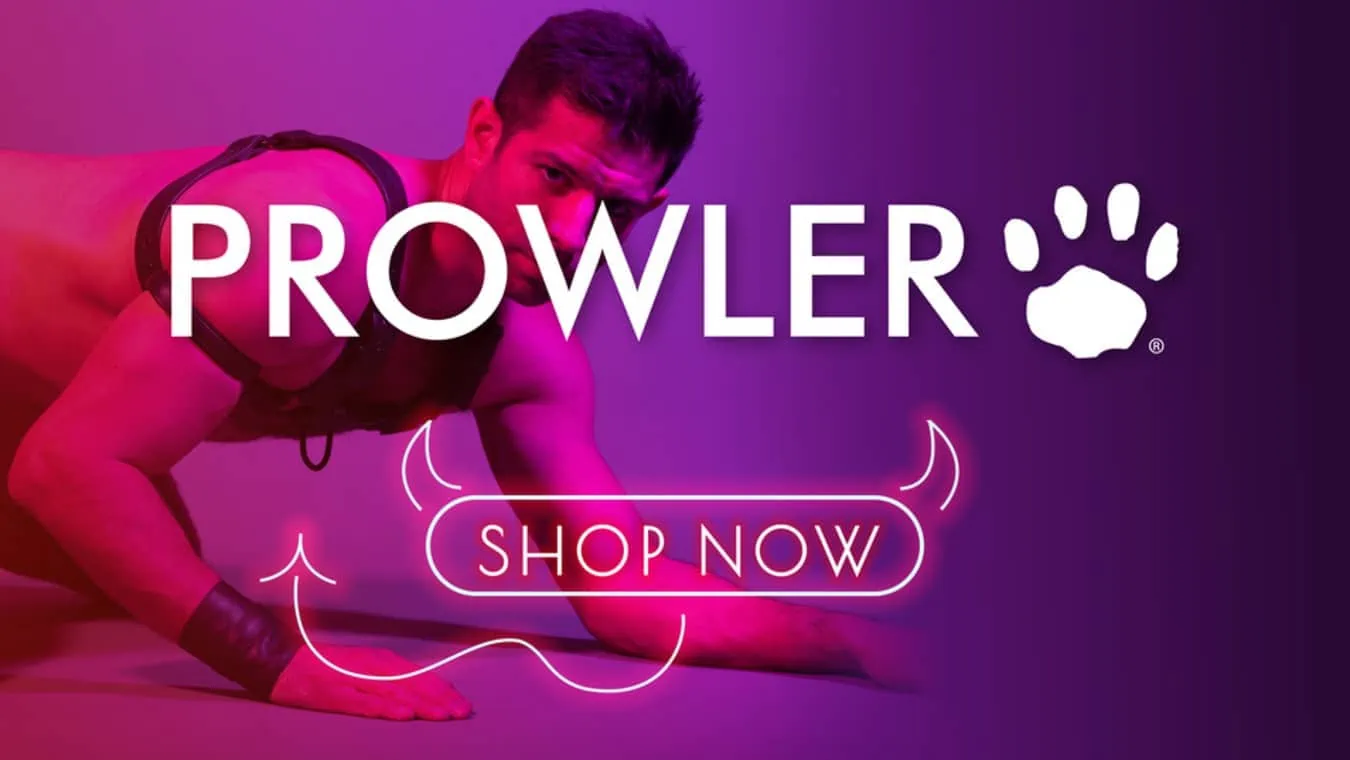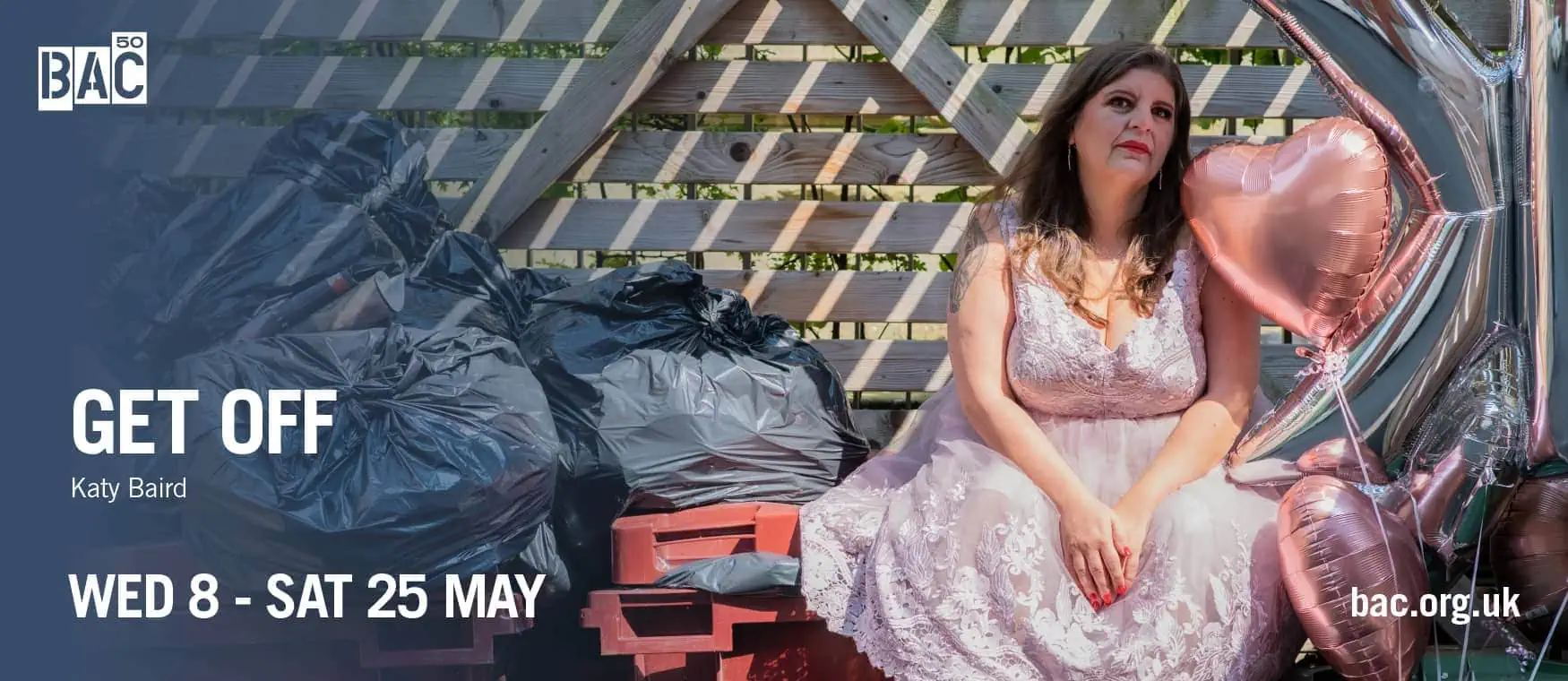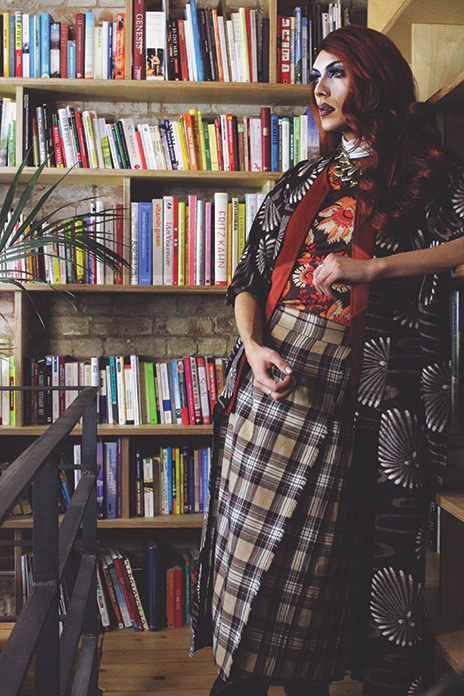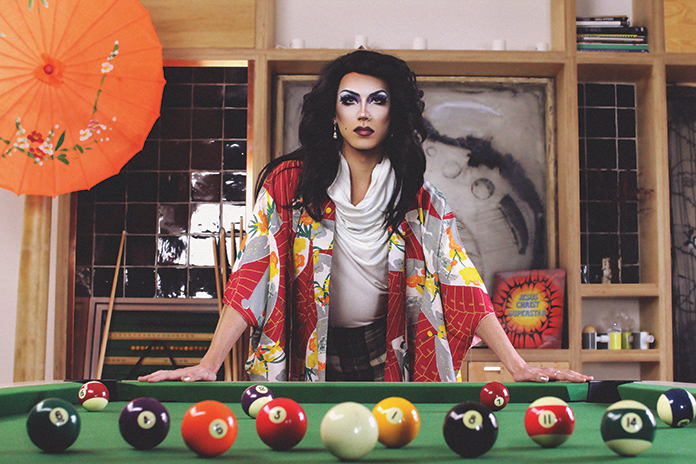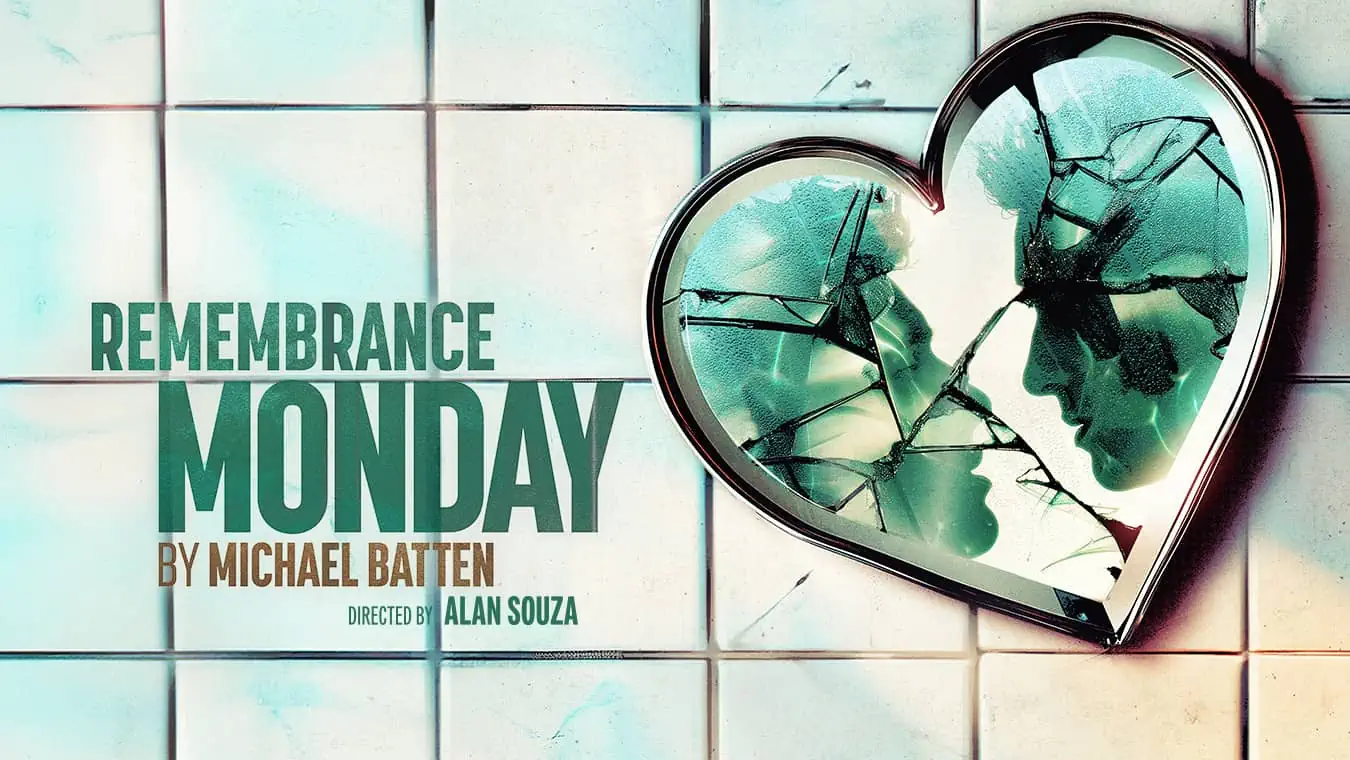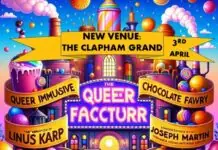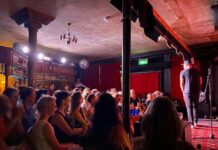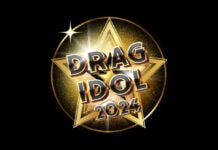We’re in a light-spattered, airily modern converted loft in Hackney. A pile of beautifully embroidered, real silk kimonos cascades over the side of a pool table, gathering in gorgeous drapes as they glissade to the floor.
Diverting pieces of unselfconscious modern art adorn the bare brick walls and a bookshelf groans under the weight of an arrestingly eclectic collection of books – How To Build A Creative Business nestles disconcertingly next to Bram Stoker’s Dracula.
Make Your Own Kind Of Music by Mama Cass Elliot warbles from a Jambox as ShayShay swishes serenely into the room, sweeping their hair from their face and popping a grape in their mouth. Altruistic, animate and American, ShayShay has a wonderfully composed and almost motherly quality. A little reminiscent of Teri Hatcher, but with a more imaginative fashion sense, and better eye-hand co-ordination.
ShayShay is one of the most well-respected performers on the East London drag and queer scene. Inventive, unique and passionate, they personify something that’s all-too-important in our increasingly fractured culture; empathy.
As a mixed race, Japanese-American/Irish queer person, ShayShay has a lot to say not just about LGBTQ society, but about society in general. Dylan Jones spoke to them about cultural appropriation, portrayal of Asian people in the media, and more.
Hey ShayShay! So you’re American, from California. Tell me your thoughts on America.
My feelings about America are too complex to even begin to explain. As humans, we like to be able to paint an entire nation of people with one brush stroke. And not just nations; religions, races, groups of people in general. We like to be able to say “NORTH KOREANS ARE BRAINWASHED” or “AMERICANS ARE RACIST.” We like saying these things, but we don’t remember that there are so many intricacies. Often, the things we believe about a place may not even be the majority’s decision. For example, Brexit. To the rest of the world, it must seem like the UK hates the EU. When really, we know the vote barely went through. Plus, did anyone really know what the fuck they were voting for? But with America, I tend to defend Americans in general. Because I don’t think the majority are the racist, gun-wielding people that the world thinks they are.
What’s your experience of America been like? Has it been positive?
My experiences in America are limited to California. And we have to remember that America is huge. California alone is bigger than the UK. America varies so much. If the UK – being as small as it is – has such vast differences between the North, the Midlands, the South…if there are so many distinctly different cultures within THAT, then America obviously has an extremely varied set of cultural values across the country. So many diverse areas too. And yet all of America is represented by one evil person. But this all relates back to making blanket statements. Making any statement about an entire group is…useful. But not accurate.
It’s very convenient isn’t it.
Yeah. Like someone might want to just say “Asian people love noodles.” And they wouldn’t be wrong in saying many Asian people love noodles. But it’s not something that can be generalized THAT simply.
I think that’s why people make blanket statements though. Because it helps them understand.
Absolutely.
So let’s talk about cultural appropriation.
Cultural appropriation is something we’ve gotten too used to seeing. It’s something we maybe would have accepted ten years ago. Now, we’re realizing that actually, in order to dismantle racism, some of these things aren’t actually acceptable. Cultural appropriation is when a person or group borrows (or steals) the cultural products of another group of people. This can be anything from food to music, but the most common form we see is the stealing of traditional cultural clothing, like Native American headdresses. It’s a sneaky form of racism that helps prop up the white supremacist structure of our world. Because of that, you must take into account the flow of power. Culprits of cultural appropriation are those with more privilege, taking the cultural imagery of a group that has less privilege.
Many people are unclear on the deeper aspects of it…
It’s all about the intent and the understanding. If you’re intellectually engaging with ideas and you’ve done your research so that you can legitimately discuss a culture that doesn’t belong to you…then that’s good. It justifies why you’re doing it. But often, the issue is, all that intent and all that research is not visible in one photo. Or one music video. Maybe you’ve learnt something from a foreign culture and you want to incorporate some of that into your work because it inspires you. But even though YOU’VE done a lot of learning, if the people who are consuming the product or art you’ve made are not learning those same lessons, then what they’re seeing is “Oh, so if that person’s wearing a kimono, that means I can throw on a bathrobe, paint my face white and call myself a geisha!” So even if you’ve gone through the right process, if your end result doesn’t challenge people to also go through that process, then you’re not actually helping the conversation along.
So there’s a fine line between appreciating other cultures and appropriating other cultures…
Yes. One sure-fire test of something being culturally appropriated is when “authenticity” is claimed. For example, with foreign food. At a music festival you might see a food truck that says “authentic Indian daal.” And you go up to it, and it’s being run by white people. And you read “their story” and it says “this daal shop was inspired by Emily and Becky’s trip to India!”
What do you think of people who say things like “oh well, is eating sushi cultural appropriation?” Where do we draw the line?
Eating another culture’s food is ok. It’s when you try to take ownership of cultural products. And food is a huge part of culture. For people who are descendants of immigrants, often the food is the only thing left. Native languages typically disappear within three generations, but the food often remains. So when people are opening restaurants and things like that, profiting off the making food of another culture – especially if they’re claiming it’s authentic – then there’s much less chance for someone OF that actual culture to open up a restaurant of their own.
So you’re saying cultural appropriation is not so much about the actions, it’s about the intent behind the actions?
Absolutely. You’ve got to question why you are using another culture’s imagery. Is it educational homage or it is purely for aesthetic purposes? But along with the intent, you have to remember how things will be perceived. For example, I was at Yo! Sissy music festival. And a female had come dressed as what appeared to be an Asian man. With a long, fake moustache and a kimono, wearing a bun with chopsticks in their hair, and a white painted face. What the person thought, was that they were being quite clever and mixing kabuki style with geisha style, and mixing gender and stuff. Which is great, and I know their intentions were not to be offensive, but they clearly hadn’t done enough research to learn that Asian men have been systematically feminised by popular culture, for over a century, in both the UK and the US…and it wasn’t just popular culture, there were even laws in the US that barred Asian men from doing “male work”. Especially in the West Coast of the US, Asian men were dry cleaners and cooks; typically female roles. Because they were the only roles they were allowed to have.
Still now, Asian men are very emasculated in the media.
Yeah. When do you ever see an Asian man in a leading role as a hunk? I can’t name a single actor who’s an Asian male that’s portrayed as attractive. They’re always the nerd, the comedic relief. Sometimes they’re an action hero, but they are always tokenised. Asian women also have terrible stereotypes in the media. They’re either really young and innocent girls (who will have sex with you of course) or they’re like, sexy dragon lady prostitute with hidden geisha secrets.
Do you think that’s slowly getting better now?
Yes, but far too slowly. It’s amazing to have Priyanka Chopra, who’s an Indian woman. And she’s a sexy woman, in television and in movies. But in order for her to make it, she’s had to become such an extreme version of feminine sexuality. Asian men are still being feminised and emasculated in popular culture. The Indian male in Big Bang Theory literally cannot even speak to women, and The Absolutely Fabulous movie features a white female playing an Asian man.
So let’s apply these things to the London scene. How do you think it deals with these issues?
I actually think the queer scene (but not the entire gay scene), is quite good about calling these things out. But I want to see more unconventional ideas of beauty in our media. Because at the moment, beauty is white. White cis-gendered beauty. I wanna see people who are unusual-looking. I say “unusual” because that’s what we’ve been told to think. What I mean is…not traditionally attractive. When we hail someone as being unusual and breaking the boundaries, usually it’s only in one small way. And then they still have to conform. For example, trans women that have reached the media’s attention and are “acceptable”, are very feminine-looking, with feminine bodies. We’re not seeing a lot of trans people who aren’t “passable.” I want to see some gender non-conforming people on TV! The queer community needs to be at the forefront of issues of prejudice and discrimination. I’d like to see more queer and gay venues not just being open-minded, but being actively diverse. I want to see them giving more attention, time, money and chances to people of colour. Or queer disabled people. It’s all very well to have your one token person of colour – which is often me – as part of your lineup so that you look diverse. But why don’t you actively try to do more. I think white men and women, in popular culture and in the gay community, have had enough time in the spotlight. Don’t take the spotlight away from them completely, but let’s give the spotlight to some other people too, and not just on nights specifically for queer people of colour.
You’re a prominent performer on the East London scene. What do you have going on at the moment?
I have the I Don’t Know Show at The Glory. Every Wednesday, just for this month. And then I have The ShayShay Show, which is the third Friday of every month, that I put the most time and effort and love into. That’s at LimeWharf and the next one is on the 20th. It’s a really nice energy, and always leaves me feeling full of queer power. I’m having more and more people contact me about performing in the space, because they’ve heard it’s a good place for new performers and new work. And that was the whole point of it from the beginning.
It’s great that you’re giving a platform to young, talented people.
What I’ve noticed in this drag scene, is that often the best way to get involved is to enter a competition. And competitions are stressful. They’re good, because they’re a crash course; you can learn so much, and you walk out with a full repertoire of stuff. But they’re daunting. So I like to be able to give people a comfy, safe place to do new stuff. A chilled out, zero-stress performance space for new work to happen. Where people can feel safe, and comfortable and confident, to do things that are new and out of their comfort zone, while also being educational to everyone in the space. Giving people something they can take away from it. So they can learn about other people’s culture, or other people’s walks of life. To understand that nothing is actually normal. There’s no such thing as normal. All of it’s been socially constructed, and we can deconstruct that and reform it to what suits us. As queer people, we’re not “normal”. So we don’t have to play by society’s rules.
The I Don’t Know Show is every Wednesday this month, at The Glory from 8pm. The ShayShay Show – Queer Power Surge is on Friday 20th October at Limewharf, 7:30pm. Head to limewharf.org for more info.


